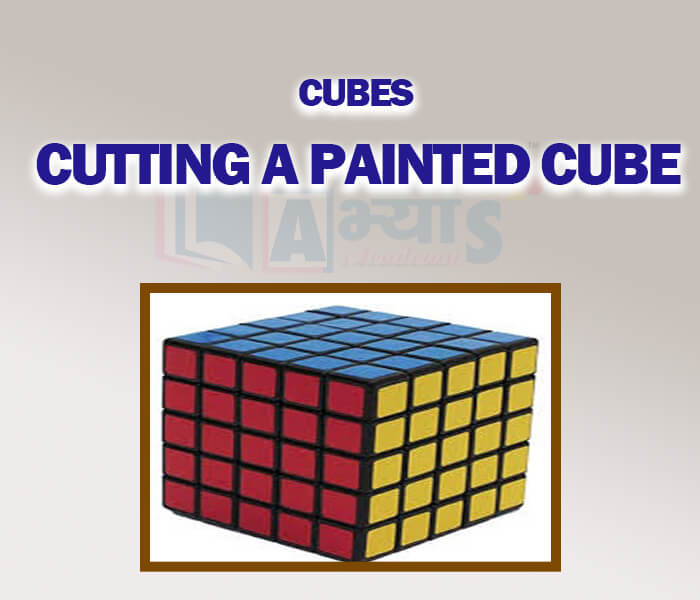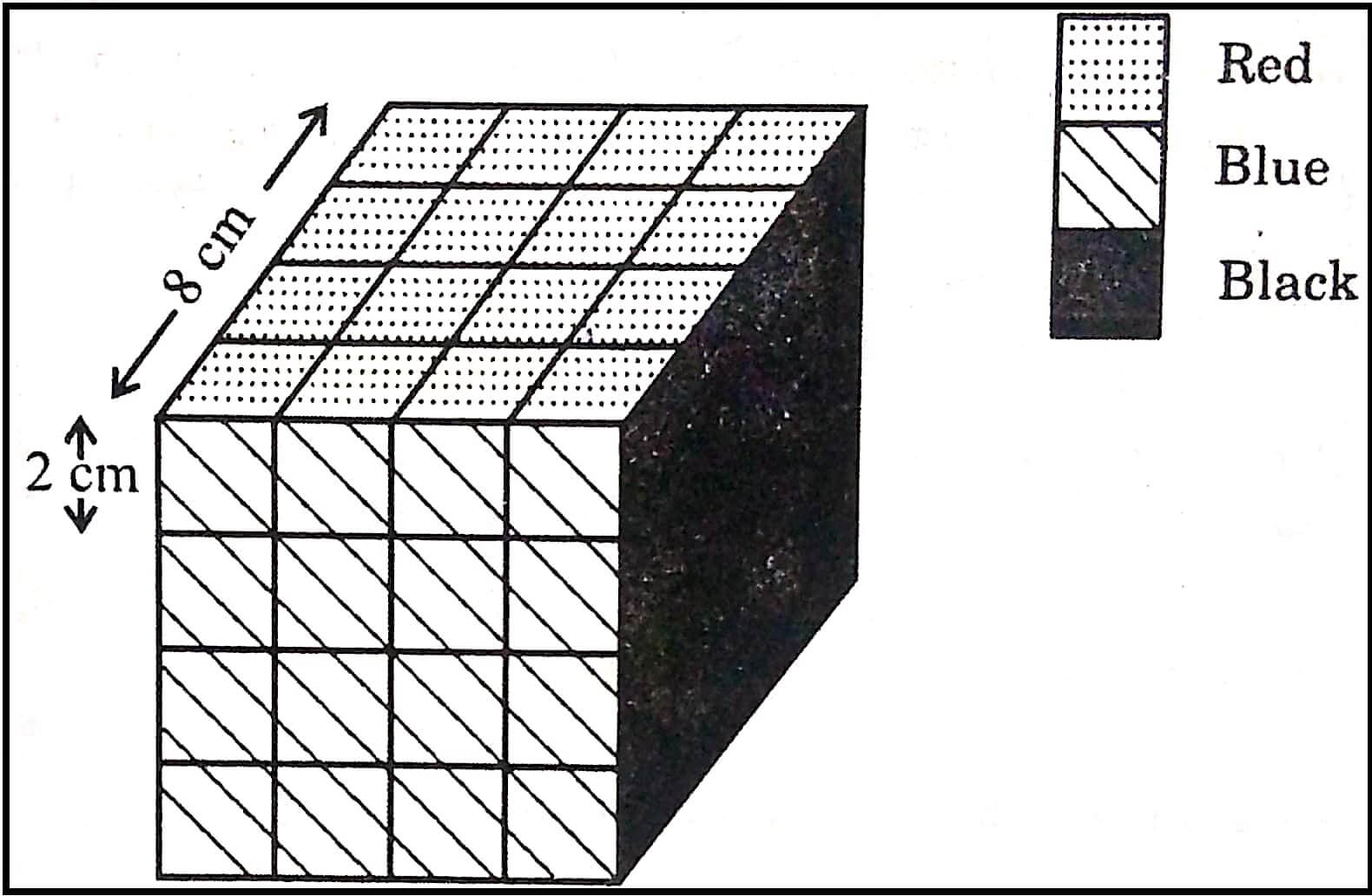Cubes - Cutting a Painted Cube

Cubes - Cutting a Painted Cube
Cubes - Cutting a Painted Cube: If a person cuts a piece of cube along any of its dimension then he gets two pieces. Now if someone makes ‘N’ number of cuts along its length then there will ‘N + 1’ number of pieces coming out of the original cube.
Now let us try with different number of cuts along different dimensions, if we have ‘L’ number of cuts along length, ‘B’ number of cuts along breadth and ‘H’ number of cuts along height then the number of pieces along these dimensions would be ‘L + 1’, ‘B + 1’ and ‘H + 1’ respectively.
Hence, total number of pieces would be (L + 1) (B + 1) (H + 1).
Let us start this with three cuts. Now we know for 3 cuts along a particular dimension there will be (3 +1) = 4 pieces.
But if we make 2 cuts along one dimension and 1 cut along another dimension then the number of pieces according to the formula given above will be (2 + 1) (1 + 1) = 6.So we can see that number of pieces would increase if we distribute the number of cutes along different dimensions.
Now here we can also consider one cut along each dimension. Where the number of pieces would be (1 + 1) (1 + 1) (1 + 1) = 8
Hence, to maximize the number of cuts here we should try to distribute the total number of cuts along each dimension as uniformly as possible.
Let us try some examples
Example : What’s the maximum number of pieces that can be obtained with 17 cuts without putting the pieces one above another?
A. 294
B. 296
C. 298
D. 300
Answer : 294
Explanation : Here, we can split 17 as 5, 6 and 6 which is the most equally distributed case. So the number of pieces will be (5 + 1) (6 +1) (6 + 1) = 294.
Example : A cube is coloured red on all faces. It is cut into 64 smaller cubes of equal size. Now, answer the following questions based on this statement :How many cubes have no face coloured?
A. 24
B. 16
C. 8
D. 10
Answer : C
Explanation : Since, there are 64 smaller cubes of equal size, therefore, n = no. of divisions on the face of undivided cube = 4
No. of cubes with no face coloured = (n – 2)³ = (4 – 2)³ = 8
A solid cube of each side 8 cms, has been painted red, blue and black on pairs of opposite faces. It is then cut into cubical blocks of each side 2 cms.
How many cubes have only two face painted ? | |||
| Right Option : D | |||
| View Explanation | |||
A solid cube of each side 8 cms, has been painted red, blue and black on pairs of opposite faces. It is then cut into cubical blocks of each side 2 cms.
How many cubes have only one face painted? | |||
| Right Option : C | |||
| View Explanation | |||
A solid cube of each side 8 cms, has been painted red, blue and black on pairs of opposite faces. It is then cut into cubical blocks of each side 2 cms.
How many cubes have one face painted blue and one face painted red ? ( the other faces may be painted or unpainted) | |||
| Right Option : B | |||
| View Explanation | |||
Students / Parents Reviews [10]
One of the best institutes to develope a child interest in studies.Provides SST and English knowledge also unlike other institutes. Teachers are co operative and friendly online tests andPPT develope practical knowledge also.

Aman Kumar Shrivastava
10thAbout Abhyas metholodology the teachers are very nice and hardworking toward students.The Centre Head Mrs Anu Sethi is also a brilliant teacher.Abhyas has taught me how to overcome problems and has always taken my doubts and suppoeted me.

Shreya Shrivastava
8thI have spent a wonderful time in Abhyas academy. It has made my reasoning more apt, English more stronger and Maths an interesting subject for me. It has given me a habbit of self studying

Yatharthi Sharma
10thA marvelous experience with Abhyas. I am glad to share that my ward has achieved more than enough at the Ambala ABHYAS centre. Years have passed on and more and more he has gained. May the centre flourish and develop day by day by the grace of God.

Archit Segal
7thIt was good as the experience because as we had come here we had been improved in a such envirnment created here.Extra is taught which is beneficial for future.

Eshan Arora
8thMy experience with Abhyas academy is very good. I did not think that my every subject coming here will be so strong. The main thing is that the online tests had made me learn here more things.

Hiya Gupta
8thAbhyas is a complete education Institute. Here extreme care is taken by teacher with the help of regular exam. Extra classes also conducted by the institute, if the student is weak.

Om Umang
10thMy experience was very good with Abhyas academy. I am studying here from 6th class and I am satisfied by its results in my life. I improved a lot here ahead of school syllabus.

Ayan Ghosh
8thIt was a good experience with Abhyas Academy. I even faced problems in starting but slowly and steadily overcomed. Especially reasoning classes helped me a lot.

Cheshta
10thAbhyas Methodology is very good. It is based on according to student and each child manages accordingly to its properly. Methodology has improved the abilities of students to shine them in future.












